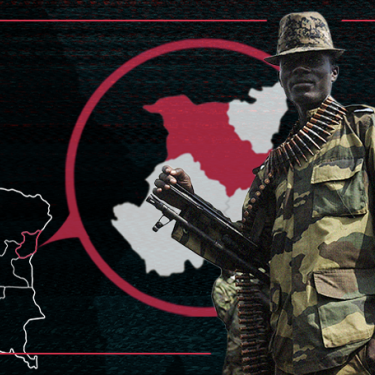Democratic Republic of Congo: information desert looms as over twenty local radio stations shut, seized and vandalized

The violent advancement of the M23, an armed rebel group, is creating a disturbing information desert in the east of the Democratic Republic of Congo (DRC). Reporters Without Borders (RSF) demands that all armed parties stop holding local radio stations hostage immediately.
Since 28 June, when M23 rebels arrived in the south of Lubero – a territory in the eastern province of North Kivu that’s key to the ongoing conflict between M23 and the national army – six radio stations have been vandalised, five are broadcasting under the control of M23 and at least 14 are now completely inactive.
Between 28 and 30 June, around fifty local journalists fled the Lubero territory, most heading to Butembo or Goma, cities within North Kivu. On 1 July, a radio director alerted RSF: “I'm fleeing into the bush. The bombs are hitting hard. I've only managed to take the transmitter, the rest of the equipment is still at the radio station.”
"Less than a month after RSF appealed to the Congolese authorities to urgently protect the local media, the worst has happened. The advance of the M23 into several major towns in the south of the Lubero territory, has led to the disappearance of free and pluralistic information in the region. We call on the parties involved in this conflict to ensure access to free and independent information, and on the authorities to guarantee the safety of all journalists.
At least six radio stations looted
In war-torn Lubero, radio stations are both individually targeted and caught in the crossfire between various armed groups. To date, at least six radio stations have been vandalised. “They came in and stole everything from the studio, then tried to sell our generator in town,” said a radio journalist from Radio Communautaire Amani (RCA), a radio based in Kanyabayonga, a strategic town in southern Lubero seized by the M23. Of the town’s three radio stations, RCA is the second to be looted since the beginning of June: one month after the DRC Armed Forces (FARDC) burst onto the premises of Radio communautaire et environnementale de Kanyabayonga (RCEKA-FM), it was ransacked by one of the multiple armed groups participating in the conflict.
In the south of the Lubero territory, local radio stations Radio étoile de Kirumba (REKI), Codel, Coq du village and Radio Communautaire Bulotwa were also vandalised. Most had all their equipment stolen, including solar panels, helmets and stools.
The M23’s growing control over the media
As journalists flee the conflict, the M23 rebels are increasing pressure on media professionals to broadcast controlled content. According to the director of one of the shuttered radio stations in town of Kirumba, the political face of the M23, Corneille Nangaa, announced at a meeting on 6 July that all those who did not resume their activities were considered to be “in collusion” with the national army.
According to information gathered by RSF, the leaders of the rebel movement drew up a list of radio stations both in operation and shut down. The M23 then contacted the management of multiple closed stations to force them to resume broadcasting. On 1 July, after 72 hours of silence, Radio Communautaire Lubero Sud (RCLS) went back on air but broadcast religious songs and notices of missing persons rather than its usual programmes. An announcement by a member of the M23 was broadcast every hour, informing listeners of a public meeting. When contacted by RSF, M23 military spokesman Willy Ngoma claimed that his movement was paying for the broadcasting of the announcements. This information was denied by the representative of RSF's partner organisation, Journaliste En Danger (JED), in the region: “The M23 does not pay, it imposes. When a member shows up to submit a press release and they’re armed, how can you say no?”
Government censorship and self-censorship
M23 has also explicitly banned some national radio stations that provide reliable information on the war, accusing these outlets of “destroying community life.” This is how Lawrence Kanyuka, political spokesman for the M23, justified the censorship of Top Congo FM, one of the country's most popular private radio stations, which broadcasts from the capital, Kinshasa. The daily programme “Sauti Ya Wahami” (‘The voice of the displaced” in Swahili), which is hosted by around fifty displaced journalists, is listed among the programmes banned by the rebel movement.
The DRC’s government has also censored coverage of the war in the east of the country: on 4 April, the telecommunications regulator (Conseil supérieur de l'audiovisuel et de la communication, or CSAC), issued a recommendation to ban journalists from broadcasting information “relating to the rebellion in the east of the DRC without referring to official sources.”
In this repressive climate, journalists are forced to censor themselves. "They have to avoid talking about security issues or the war if they don't want to be arrested. Instead, they talk about agriculture, for example,” says JED's representative in the region. Journalists are also broadcasting more music.
While some journalists from the region's community radio stations who fled the deteriorating security situation are already beginning to return to, or intend to resume, their work, others are organising themselves to broadcast remotely via the Internet, particularly with podcasts.
